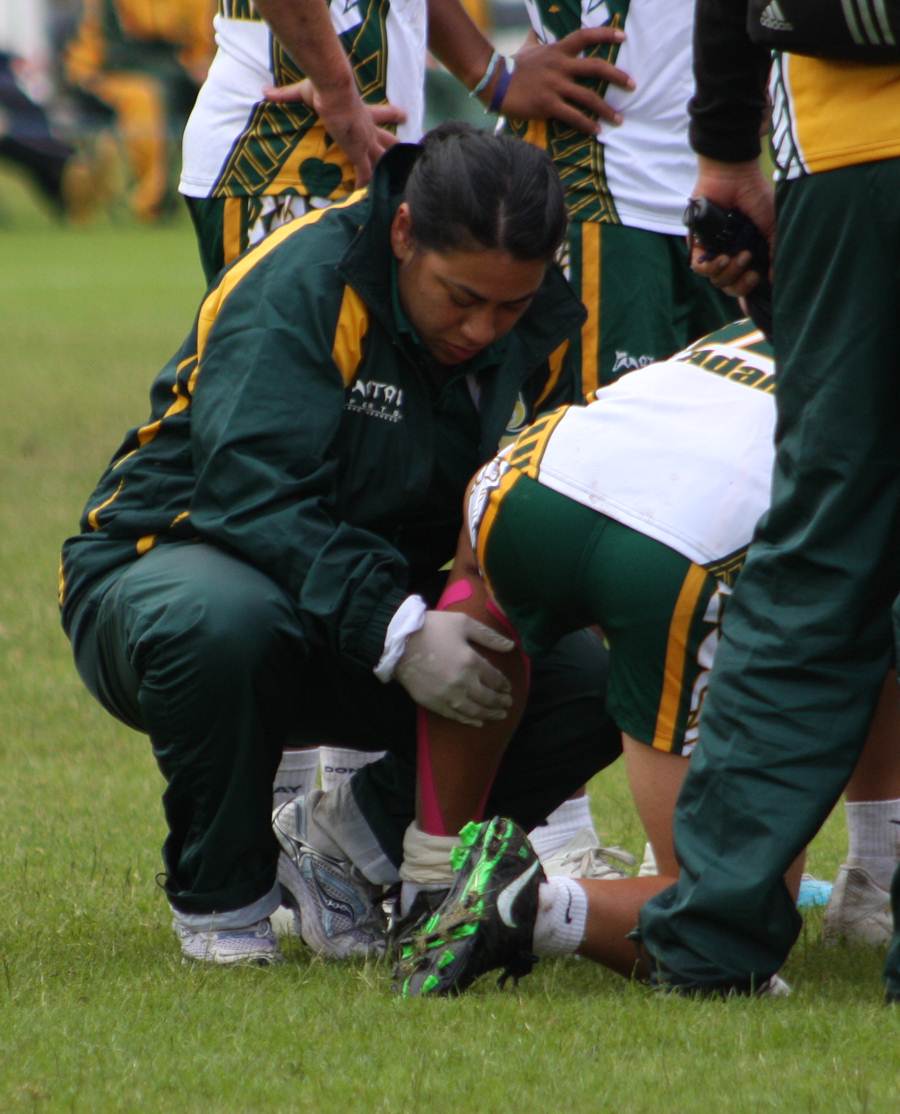By Charleen Silcock
Recently, I completed a residential week as part of my post graduate studies in Sports Physiotherapy at the University of Otago and I’ve been reflecting on my experiences travelling with teams. I’m fortunate to get the opportunity to travel overseas for various sports in the smaller Pacific nations. It’s been fun, challenging, and full of learning curves. On these tours, I I’ve been the physiotherapist, nutrition advisor, recovery person, masseuse, sunscreen dispenser, water carrier, and photographer, all rolled into one. It turns out that we’re often the first up and the last to bed – physios are multitalented and multifaceted people!
Physiotherapists are innovative therapists, we adapt to surroundings and situations
There have been times I have used a bag strap as a seatbelt for Mobilisation With Movement (MWMs) techniques, spent hours in an ED department with an athlete, assessed and monitored injuries on aeroplanes, utilised the best naturally occurring electrolyte replacement: coconut water – straight from the tree; taken recovery sessions in a lagoon, massaged and strapped on the side-line, and undertaken 2-hourly monitoring of an athlete through the night. I have written long post tournament reports with injury statistics, and recommendations for future campaigns.
There have been players buying new boots the day before competition, with the intention of playing in them. I have watched faces light up when they enter the extensive buffet food hall, with everything from pasta to pizza, salad to sushi and every dessert you can imagine, only to feel disappointment when we discuss tournament food choices which did not include any of those foods. I have worked through the gastro bug that sweeps through a team while trying to keep players on the field. Fortunately, I had packed some probiotics for myself for that trip and every trip since!
Experience has taught me resilience
It’s taught me to make the most of what you have, to expect the unexpected and prepare for anything. Each tour I have asked myself what could I do better, did I do right by the athlete? Was player welfare at the top of the list? How did this affect my ability to work effectively in a sports physiotherapy context? Sometimes, I wish that I knew then what I know now. I wish that I could go back and prepare more, know athletes better, ask more questions, and have had more time to prepare for each tournament, maybe at least 6 months in advance.
At the end of the day, it all comes down to preparation
In the realm of sports physiotherapy, there are a range of injuries you may encounter, from heat and dehydration related illnesses, to concussions and nutrition related issues. Injuries may be related to poor equipment, footwear, loading or deconditioning, or simply undertraining leading up to competition. At the end of the day, it all comes down to this: Preparation. Preparation of the athlete, and preparation of the support team around the athlete. A nice summary can be found here on this BJSM podcast on travelling with teams.
With preparation comes time, education and funding. Often, smaller Pacific nations are self-funded, or receive a small amount of government funding and fundraise the rest. There may be limited funding for a physiotherapist, including flights and accommodation without reimbursement for time. Resources may not be able to stretch to fund pre-screening or education workshops surrounding nutrition, hydration, and conditioning. If teams are coming from overseas and you practice in New Zealand, you often meet some athletes for the first time on arrival at the airport. Waiting in departure lounges makes for good time spent information gathering!
Giving attention to smaller nations: sports physiotherapy in the Pacific
How can we ensure smaller nations can best prepare and compete on a level playing field with larger countries? Firstly, we need to incorporate sports physiotherapy in the Pacific. It needs to be a mainstream integration into the health system. The Pacific Islands are a melting pot of talent and athleticism. Sport is played all year round and there is no such thing as an “offseason” for these athletes. Access to sports medicine is limited and generally only through competition or overseas. It is not uncommon to be at a tournament, assessing an athlete who remembers hurting their knee previously, and finding a positive Lachman’s and anterior draw tests; yet they have returned to their sport, or training, albeit with some limitation. It’s time to take advantage of the amazing learning opportunities we have within the sports medicine profession and put it into practice at the coalface. We need to share knowledge, to promote preparation techniques as well as player welfare, with the ultimate goal of minimising risk, and avoid being the canoe at the bottom of the lagoon.

Charleen Silcock is a musculoskeletal physiotherapist undertaking her Sports Physiotherapy post graduate studies at the School of Physiotherapy, University of Otago, New Zealand.
The University of Otago now runs a Masters in Physiotherapy course for New Zealand and international registered physiotherapists seeking to advance clinical reasoning and athlete/patient management skills. Find out more in the BJSM article: http://bjsm.bmj.com/content/51/5/481